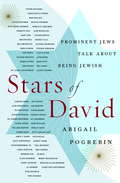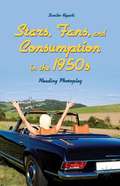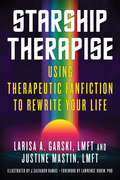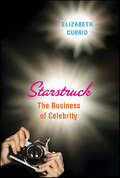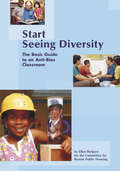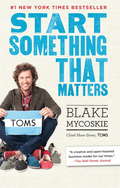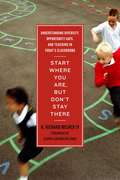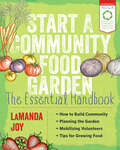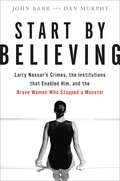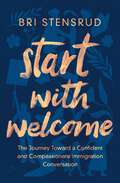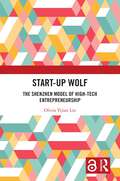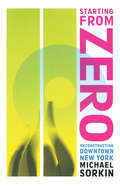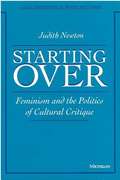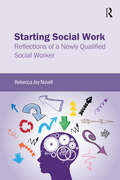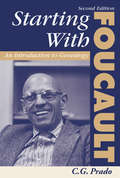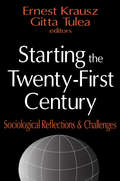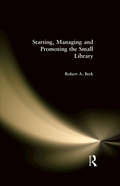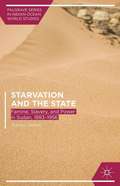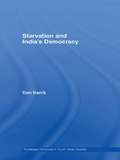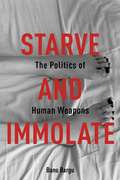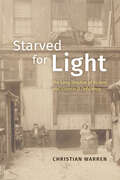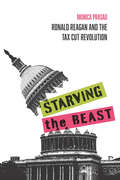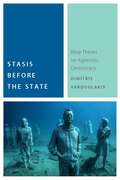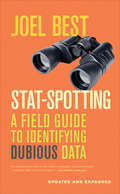- Table View
- List View
Stars of David: Prominent Jews Talk About Being Jewish
by Abigail PogrebinSixty-two of the most accomplished Jews in America speak intimately--most for the first time--about how they feel about being Jewish. In unusually candid interviews conducted by former 60 Minutes producer Abigail Pogrebin, celebrities ranging from Sarah Jessica Parker to Supreme Court Justice Ruth Bader Ginsburg, from Larry King to Mike Nichols, reveal how resonant, crucial or incidental being Jewish is in their lives. The connections they have to their Jewish heritage range from hours in synagogue to bagels and lox; but every person speaks to the weight and pride of their Jewish history, the burdens and pleasures of observance, the moments they've felt most Jewish (or not). This book of vivid, personal conversations uncovers how being Jewish fits into a public life, and also how the author's evolving religious identity was changed by what she heard. Dustin Hoffman, Steven Spielberg, Gene Wilder, Joan Rivers, and Leonard Nimoy talk about their startling encounters with anti-Semitism. Kenneth Cole, Eliot Spitzer, and Ronald Perelman explore the challenges of intermarriage. Mike Wallace, Richard Dreyfuss, and Ruth Reichl express attitudes toward Israel that vary from unquestioning loyalty to complicated ambivalence. William Kristol scoffs at the notion that Jewish values are incompatible with Conservative politics. Alan Dershowitz, raised Orthodox, talks about why he gave up morning prayer. Shawn Green describes the pressure that comes with being baseball's Jewish star. Natalie Portman questions the ostentatious bat mitzvahs of her hometown. Tony Kushner explains how being Jewish prepared him for being gay. Leon Wieseltier throws down the gauntlet to Jews who haven't taken the trouble to study Judaism. These are just a few key moments from many poignant, often surprising, conversations with public figures whom most of us thought we already knew. "When my mother got her nose job, she wanted me to get one, too. She said I would be happier." --Dustin Hoffman. "It's a heritage to be proud of. And then, too, it's something that you can't escape because the world won't let you; so it's a good thing you can be proud of it." --Ruth Bader Ginsburg. "My wife [Kate Capshaw] chose to do a full conversion before we were married in 1991, and she married me as a Jew. I think that, more than anything else, brought me back to Judaism."--Steven Spielberg. "As someone who was born in Israel, you're put in a position of defending Israel because you know how much is at stake."--Natalie Portman. "Jewish introspection and Jewish humor is a way of surviving ... if you're not handsome and you're not athletic and you're not rich, there's still one last hope with girls, which is being funny." --Mike Nichols. "I felt not only this enormous pride at being a Jew; I felt this enormous void at not being a better Jew."--Ronald O. Perelman. "American Jews, like Americans, have a very consumerist attitude toward their identity: they pick and choose the bits of this and that they like."--Leon Wieseltier. "I thought if I had straight hair and a perfect nose, my whole career would be different." --Sarah Jessica Parker. "I've always rebelled a little when people say, 'My Jewish values lead me to really care about the poor.' I know some Christians who care about the poor, too." --William Kristol.
Stars, Fans, And Consumption In The 1950s
by Sumiko HigashiAs the leading fan magazine in the postwar era, Photoplay constructed female stars as social types who embodied a romantic and leisured California lifestyle. Addressing working and lower-middle class readers who were prospering in the first mass consumption society, the magazine published not only publicity stories but also beauty secrets, fashion layouts, interior design tips, recipes, advice columns, and vacation guides. Postwar femininity was constructed in terms of access to commodities in suburban houses as the site of family togetherness. As the decade progressed, however, changing social mores regarding female identity and behavior eroded the relationship between idolized stars and worshipful fans. When the magazine adopted tabloid conventions to report sex scandals like the Debbie-Eddie-Liz affair, stars were demystified, and fans became scandalmongers. But the construction of female identity based on goods and performance that resulted in unstable, fragmented selves remains a legacy evident in postmodern culture today.
Starship Therapise: Using Therapeutic Fanfiction to Rewrite Your Life
by Larisa A. Garski Justine MastinHarnessing the power of fandom--from Game of Thrones to The Legend of Zelda--to conquer anxiety, heal from depression, and reclaim balance in mental and emotional health.Modern mythologies are everywhere--from the Avengers of the Marvel Cinematic Universe to the dragons of Game of Thrones. Where once geek culture was niche and hidden, fandom characters and stories have blasted their way into our cineplexes, bookstores, and streaming systems. They help us make sense of our daily lives--and they can also help us heal. Mental health therapists and Starship Therapise podcast hosts Larisa A. Garski and Justine Mastin offer a self-help guide to the mental health galaxy for those who have been left out in more traditional therapy spaces: geeks, nerds, gamers, cosplayers, introverts, and all of their friends.Starship Therapise explores the ways in which narratives and play inform the shape of our lives, inviting readers to embrace radical self-care with lessons from Westworld's Maeve and Dolores, explore anxiety with Miyazaki, and understand narrative therapy with Arya Stark. Spanning fandom from Star Wars to Harry Potter, The Legend of Zelda to Steven Universe, and everywhere in between, Starship Therapise is an invitation to explore mental health and emotional wellness without conforming to mainstream social constructions.Insights from comics like Uncanny X-Men, Black Panther, Akira, Bitch Planet, The Wicked + Divine, and Batman offer avenues to growth and self-discovery alongside explorations of the triumphs and trials of heroes, heroines, and beloved characters from Star Wars, Wuthering Heights, The Lord of the Rings, The Broken Earth trilogy, Mass Effect, Fortnite, Minecraft, Buffy the Vampire Slayer, and Star Trek. Each chapter closes with a hands-on mindfulness, meditation, or yoga exercise to inspire reflection, growth, and the mind-body-fandom connection.
Starstruck: The Business of Celebrity
by Elizabeth CurridThe author of The Warhol Economy asks how does celebrity work and why do we care about some people more than others? What is celebrity? Why is it such a dominant force in our culture? And why do we seem preoccupied with it now more than ever? Celebrity—our collective fascination with particular people—is everywhere and takes many forms, from the sports star, notorious Wall Street tycoon, or film icon, to the hometown quarterback, YouTube sensation, or friend who compulsively documents his life on the Internet. We follow with rapt attention all the minute details of stars' lives: their romances, their spending habits, even how they drink their coffee. For those anointed, celebrity can translate into big business and top social status, but why do some attain stardom while millions of others do not? Why are we simply more interested in certain people? Elizabeth Currid-Halkett presents the first rigorous exploration of celebrity, arguing that our desire to "celebrate" some people and not others has profound implications, elevating social statuses, making or breaking careers and companies, and generating astronomical dividends. Tracing the phenomenon from the art world to tabletop gaming conventions to the film industry, Currid-Halkett looks at celebrity as an expression of economics, geography (both real and virtual), and networking strategies.Starstruck brings together extensive statistical research and analysis, along with interviews with top agents and publicists, YouTube executives, major art dealers and gallery directors, Bollywood players, and sports experts. Laying out the enormous impact of the celebrity industry and identifying the patterns by which individuals become stars, Currid-Halkett successfully makes the argument that celebrity is an important social phenomenon and a driving force in the worldwide economy.
Start Seeing Diversity
by Ellen WolpertStart Seeing Diversity helps teachers recognize and reduce bias in young children by illustrating one community's effort to create a responsive child care program.Developed by teachers at Washington-Beech Community Preschool in Boston, this training handbook provides a framework for understanding bias among preschool children, reorganized for stand-alone use as a student text. Nine detailed chapters treat six areas of bias-gender, age, sexual orientation, race and ethnicity, economic class, and physical abilities-as well as the goals and guiding assumptions of anti-bias curriculum. Accompanying discussion questions encourage readers to examine their own memories and experiences.Perfect for pre-service and in-service teacher training, this helpful guide includes information-rich appendices containing:Guidelines for challenging oppression and responding to incidents involving biasA checklist for creating and assessing anti-bias environmentsA guide to analyzing children's booksDirections for making photograph games like the ones used at Washington-BeechThe book also includes sample scenarios, details for classroom implementation, suggested resources, and guidelines for group leaders.Ellen Wolpert is the founding director of the Washington-Beech Community Preschool in Boston. Ms. Wolpert currently works for Education Development Center, Inc., in Newton, Massachusetts.
Start Something That Matters
by Blake MycoskieLove your work, work for what you love, and change the world--all at the same time. What matters most to you? Should you focus on earning a living, pursuing your passions, or devoting yourself to the causes that inspire you? The surprising truth is that you don't have to choose--and that you'll find more success if you don't. That's the breakthrough message of TOMS' One for One movement. You don't have to be rich to give back and you don't have to retire to spend every day doing what you love. You can find profit, passion, and meaning all at once--right now. In Start Something That Matters, Blake Mycoskie tells the story of TOMS, one of the fastest-growing shoe companies in the world, and combines it with lessons learned from such other innovative organizations as method, charity: water, FEED Projects, and TerraCycle. Blake presents the six simple keys for creating or transforming your own life and business, from discovering your core story to being resourceful without resources; from overcoming fear and doubt to incorporating giving into every aspect of your life. No matter what kind of change you're considering, Start Something That Matters gives you the stories, ideas, and practical tips that can help you get started. Why this book is for you: * You're ready to make a difference in the world--through your own start-up business, a nonprofit organization, or a new project that you create within your current job.* You want to love your work, work for what you love, and have a positive impact on the world--all at the same time.* You're inspired by charity: water, method, and FEED Projects and want to learn how these organizations got their start. * You're curious about how someone who never made a pair of shoes, attended fashion school, or worked in retail created one of the fastest-growing footwear companies in the world by giving shoes away.* You're looking for a new model of success to share with your children, students, co-workers, and members of your community. You're ready to start something that matters.
Start Where You Are, But Don't Stay There: Understanding Diversity, Opportunity Gaps, and Teaching in Today's Classrooms
by H. Richard MilnerStart a Community Food Garden: The Essential Handbook
by LaManda JoyRecommended by the American Community Gardening Association Community gardening enhances the fabric of towns and cities through social interactions and accessibility to fresh food, creating an enormously positive effect in the lives of everyone it touches. LaManda Joy, the founder of Chicago’s Peterson Garden Project and a board member of the American Community Gardening Association, has worked in the community gardening trenches for years and brings her knowledge to the wider world in Start a Community Food Garden. This hardworking guide covers every step of the process: fundraising, community organizing, site sourcing, garden design and planning, finding and managing volunteers, and managing the garden through all four seasons. A section dedicated to the basics of growing was designed to be used by community garden leaders as an educational tool for teaching new members how to successfully garden.
Start by Believing: Larry Nassar's Crimes, the Institutions that Enabled Him, and the Brave Women Who Stopped a Monster
by Dan Murphy John BarrThe definitive, devastating account of the largest sex abuse scandal in American sports history-with new details and insights into the institutional failures, as well as the bravery that brought it to light.For decades, osteopathic physician Larry Nassar built a sterling reputation as the go-to doctor for America's Olympians while treating countless others at his office on Michigan State University's campus. It was largely within the high-pressure world of competitive gymnastics that Nassar exploited young girls, who were otherwise motivated by fear and intimidation, sexually assaulting hundreds of them under the guise of medical treatment. In Start by Believing, John Barr and Dan Murphy confront Nassar's acts, which represent the largest sex abuse scandal to impact the sporting world. Through never-before-released interviews and documents they deconstruct the epic institutional failures and individuals who enabled him. When warnings were raised, self-serving leaders chose to protect their organizations' reputations over the well-being of young people. Following the paths traveled by courageous women-featuring a once-shy Christian attorney and a brash, outspoken Olympic medalist-Barr and Murphy detail the stories of those who fought back against the dysfunction within their sport to claim a far-from-inevitable victory. The gymnasts' uncommon perseverance, along with the help of dedicated advocates brought criminals to justice and helped to fuel the #MeToo revolution. Start by Believing reveals the win-at-all-costs culture in elite athletics and higher education that enabled a quarter century of heinous crimes.
Start with Welcome: The Journey toward a Confident and Compassionate Immigration Conversation
by Bri StensrudAsking the hard questions about immigration in light of Jesus' call to love our neighbors as ourselves.You've seen the headlines. You've watched the TV footage. People around the world are in dire situations and on the move. Current estimates suggest over 100 million people are forcibly displaced from their homes and seeking refuge in other countries. It seems as if everyone wants to come to the U.S., and if we're honest, that gives many of us pause.We wonder how it would impact our culture and communities if we showed welcome to the world, and many of us wonder how to separate the political rhetoric and talking points on present day immigration from what the Bible really has to say about immigrants and strangers.Start with Welcome dives into the whole narrative of Scripture to better understand what God calls us to do concerning immigrants and refugees. Bri Stensrud will guide you through pressing questions that will ignite your compassion and leave you curious about our calling as followers of Christ—questions like:Is Immigration a Pro-Life Issue?What does the Bible say about Immigrants?Who is Welcome here?What does Christlike Welcome look like? You have questions. You have fears. But you also have compassion.So, let's start there.Bri Stensrud welcomes you into the conversation—a conversation that&’s more urgent now than ever. It all starts with one word: Welcome.
Start-up Wolf: The Shenzhen Model of High-Tech Entrepreneurship
by Olivia Yijian LiuTransnational entrepreneurs with technological know-how have been promoted by the Chinese state and academic literature as a central force for regional development of industrial competitiveness. But what motivates them, and what do they experience and aspire to when building a start-up in China? This book answers these questions by examining how socially privileged entrepreneurial talents adopt and champion the "wolf culture" – a fast-paced, competitive, and aspirational work culture – that has become prevalent since China's mass promotion of entrepreneurship and innovation.Based on extensive field research, including participant observation and interviews in Shenzhen's high-tech industry, this book challenges the popular notion of entrepreneurship as entirely self-initiated and passion-driven. Outlining the concrete instruments of governance of the local state, the author argues that transnational talent from elite schools or elite professions is often "entrepreneured" in China. Moreover, she argues that the different standards of selection of entrepreneurial talents by state and market actors create localised precarious conditions for them. This book offers fascinating insights into the contradictions inherent in the Chinese model of entrepreneurship.Start-up Wolf will appeal to scholars and students of China studies, the anthropology of entrepreneurship, science and technology studies, and economic geography, as well as business practitioners interested in innovation and high-tech start-ups.The Open Access version of this book, available at http://www.taylorfrancis.com, has been made available under a Creative Commons Attribution-Non Commercial-No Derivatives (CC-BY-NC-ND) 4.0 license.
Starting From Zero: Reconstructing Downtown New York
by Michael SorkinArchitect and social critic Michael Sorkin develops his own vision of the future lower Manhattan through a series of chronologically organized essays illustrated with full-color images of his own plans. Mixing his inimitable brand of social criticism with more personal reflections, Starting From Zero offers a striving challenge to the Ground Zero redevelopment plan recently chosen by New York's establishment insiders.
Starting Over: Feminism and the Politics of Cultural Critique
by Judith NewtonFor more than a decade Judith Newton has been at the forefront of defining and promoting materialist feminist criticism. Starting Over brings together a selection of her essays that chart the establishment of feminist literary criticism in the academy and its relation to other forms of cultural criticism, including Marxist, post-Marxist, new historicist, and cultural materialist approaches, as well as cultural studies. The essays in Starting Over have functioned as exemplars of interdisciplinary thinking, mapping out the ways in which reading strategies and the constructions of history, culture, identity, change, and agency in various materialist theories overlap, and the ways in which feminist-materialist work both draws upon, revises, and complicates the vision of nonfeminist materialist critiques. They are shaped by an awareness that public knowledge is always informed by the so-called private realm of familial and sexual relations and that cultural criticism must bring together investigations of daily behaviors, economic and social relations, and the dynamics of race, class, gender, and sexual struggle. Starting Over is a brilliant synthesis of literature, history, anthropology, the many influential trends in contemporary theory, and the politics of feminism.
Starting Social Work: Reflections of a Newly Qualified Social Worker
by Rebecca Joy NovellSocial Work often receives a bad press but it is an intellectually, emotionally and practically challenging profession which, in order to help people effectively, needs to attract the best candidates. This book takes a personal and human approach and presents a Newly Qualified Social Worker’s experience, reflections and gentle advice on the training process and early years of a Social Work career.Written in an accessible and honest style, it gives a fresh perspective at a time when there is a national turning-point in Social Service reform. It highlights the positive and negative aspects of becoming a Social Worker and is grounded in real service user cases. For those embarking on or thinking about a career in social work, this book will be an invaluable read.It is so refreshing to see a newly qualified social worker producing a book about their experience of challenges and joys of social work education and their first steps as a social worker. A valuable contribution.Professor Harry Ferguson, Nottingham University...What was apparent was how Rebecca reminds the reader why they entered the profession and the importance of not becoming jaded so that social workers continue to offer the support and resources that young people need to make positive changes in their lives, in short at times the book was inspiring.Matthew Smith, University of Cumbria
Starting With Foucault: An Introduction To Genealogy
by C. G. PradoMichel Foucault had a great influence upon a wide range of disciplines, and his work has been widely interpreted and is frequently referred to, but it is often difficult for beginners to find their way into the complexities of his thought. This is especially true for readers whose background is Anglo-American or "analytic" philosophy. C. G. Prado argues in this updated introduction that the time is overdue for Anglo-American philosophers to avail themselves of what Foucault offers. In this clear and greatly-revised second edition, Prado focuses on Foucault's "middle" or genealogical work, particularly Discipline and Punish and Volume One of The History of Sexuality, in which Foucault most clearly comes to grips with the historicization of truth and knowledge and the formation of subjectivity. Understanding Foucault's thought on these difficult subjects requires working through much complexity and ambiguity, and Prado's direct and accessible introduction is the ideal place to start.
Starting the Twenty-first Century: Sociological Reflections and Challenges
by Ernest Krausz Gitta TuleaJrgen Habermas, speaking of postmodern society, remarked that extension of the means of communication not only allows a wide range of information, but it also encourages permanent connections between different peoples, cultures, and social discourses. It thus facilitates better general understanding, a clarifying of real or apparent contradictions. But this process becomes truly positive only when it is performed between equal members. Globalization of information does not minimize the possibility of conflict or terrorism, if fundamental social problems are not resolved or at least approached in an active way.This volume examines the major upheavals of the twentieth century and views within the framework of these events and challenges implications for the future. "Values and Cultural Changes in the Postmodern World," by Zygmunt Bauman explores the changing meaning of space in the globalizing environment; S.N. Eisenstadt analyzes the destructive components of modernity; and Irving Louis Horowitz draws attention to the classical values of the common universal culture. "Social Development and Policies in Contemporary Society," by Michael M. Cernea, examines the importance of the applied and policy-orientated research, especially in the developing countries, and David Marsland stresses the positive role of sociology in pointing to the possibilities of improving healthcare in modern society. "Societies in Transition-Eastern Europe," emphasizes transitions that have occurred in Eastern Europe. Rozalina Rjyvkina and Leonid Kosals provide an incisive study of the situation in Russia, while Jerzy J. Wiatr presents a comparative analysis of postcommunist societies, with special reference to Poland. "The Jewish World: Pre- and Post-Holocaust," by Regina Azria, discusses the identity problems in the Diaspora confronting modernity; Eva Etzioni-Halevi considers the newly developed Israeli society from the point of view of the exercise and distribution of power; and a most interesting contribution by Annette Wieviorka concerns the material and spiritual effects of the Holocaust on the Jews of France.Social historians and students of Judaica, as well as a general public interested in cultural pluralism will find this well-developed volume essential reading.
Starting, Managing and Promoting the Small Library
by Robert BerkA guide to the establishment of the library which covers materials acquisition, the organization and usage of the library's collection to provide a variety of services and the use of automation. This book aims to instruct the librarian on managing the small library effectively.
Starvation And The State
by Steven SerelsSudan has historically suffered devastating famines that have powerfully reshaped its society. This study shows that food crises were the result of exploitative processes that transferred resources to a small group of beneficiaries, including British imperial agents and indigenous elites who went on to control the Sudanese state at independence.
Starvation and India's Democracy (Routledge Advances in South Asian Studies)
by Dan BanikThis book analyzes India’s impressive efforts in responding to sensational and easily visible disasters in contrast to the ‘silent emergency’ of drought-induced under nutrition and starvation deaths. Building on Amartya Sen’s famous claim that no famine has ever occurred in a democratic country, it re-examines the relationship between democracy, public action and famine prevention. Drawing on both quantitative and qualitative data in India at national, state and local levels as well as in-depth field visits to two states on India’s east coast, Orissa and West Bengal, the author analyzes the following issues: the interaction between specific institutions in India and their accountability to the public the role of the media in highlighting problems of extreme poverty and destitution and the effectiveness of political and administrative responses to such reports the extent to which tribal groups are vulnerable to starvation and famine, and an analysis of whether starvation deaths in drought-prone Kalahandi district in Orissa are unique in India the impact of two major nutrition programmes, the Public Distribution System (PDS) and the Integrated Child Development Services (ICDS), in reducing the incidence, duration and impact of starvation deaths. Starvation and India’s Democracy will be of interest to researchers in economics, political science, philosophy, development studies and South Asian studies.
Starve and Immolate: The Politics of Human Weapons
by Banu BarguTells the story of leftist political prisoners in Turkey who waged a deadly struggle against the introduction of high security prisons by forging their lives into weapons.
Starved for Light: The Long Shadow of Rickets and Vitamin D Deficiency
by Christian WarrenA wide-ranging history of rickets tracks the disease’s emergence, evolution, and eventual treatment—and exposes the backstory behind contemporary worries about vitamin D deficiency. Rickets, a childhood disorder that causes soft and misshapen bones, transformed from an ancient but infrequent threat to a common scourge during the Industrial Revolution. Factories, mills, and urban growth transformed the landscape. Malnutrition and insufficient exposure to sunlight led to severe cases of rickets across Europe and the United States, affecting children in a variety of settings: dim British cities and American slave labor camps, moneyed households and impoverished ones. By the late 1800s, it was one of the most common pediatric diseases, seemingly an intractable consequence of modern life. Starved for Light offers the first comprehensive history of this disorder. Tracing the efforts to understand, prevent, and treat rickets—first with the traditional remedy of cod liver oil, then with the application of a breakthrough corrective, industrially produced vitamin D supplements—Christian Warren places the disease at the center of a riveting medical history, one alert to the ways society shapes our views on illness. Warren shows how physicians and public health advocates in the United States turned their attention to rickets among urban immigrants, both African Americans and southern Europeans; some concluded that the disease was linked to race, while others blamed poverty, sunless buildings and cities, or cultural preferences in diet and clothing. Spotlighting rickets’ role in a series of medical developments, Warren leads readers through the encroachment on midwifery by male obstetricians, the development of pediatric orthopedic devices and surgeries, early twentieth-century research into vitamin D, appalling clinical experiments on young children testing its potential, and the eventual commercialization of all manner of vitamin D supplements. As vitamin D consumption rose in the mid-twentieth century, rickets—previously a major concern for doctors, parents, and public health institutions—faded in its severity and frequency, and as a topic of discussion. But despite the availability of drugstore supplements and fortified milk, small numbers of cases still appear today, and concerns and controversies about vitamin D deficiency in general continue to grow. Sweeping and engaging, Starved for Light illuminates the social conditions underpinning our cures and our choices, helping us to see history’s echoes in contemporary prescriptions.
Starving the Beast: Ronald Reagan and the Tax Cut Revolution
by Monica PrasadSince the Reagan Revolution of the early 1980s, Republicans have consistently championed tax cuts for individuals and businesses, regardless of whether the economy is booming or in recession or whether the federal budget is in surplus or deficit. In Starving the Beast, sociologist Monica Prasad uncovers the origins of the GOP’s relentless focus on tax cuts and shows how this is a uniquely American phenomenon. Drawing on never-before seen archival documents, Prasad traces the history of the 1981 tax cut—the famous “supply side” tax cut, which became the cornerstone for the next several decades of Republican domestic economic policy. She demonstrates that the main impetus behind this tax cut was not business group pressure, racial animus, or a belief that tax cuts would pay for themselves. Rather, the tax cut emerged because Republicans believed that following World War II, Democrats had created an extremely durable power structure based on offering government programs to Americans, through which they were able to unify an otherwise fractious coalition of farmers, workers, and African Americans and retain control of Congress for four decades. Republicans were reduced to lecturing about balanced budgets, an issue that did not win them many elections. The Republican party began to see tax cuts as an opportunity to alter these basic building blocks of American power. If Democratic power was built out of government programs, Republicans found a new power source in offering tax cuts. Once it became clear that the resulting deficits could be financed by foreign capital, this program reoriented the Republican Party, transforming it from the party of fiscal rectitude into a party whose main domestic policy goal is reducing taxes. With one party promoting government programs to appeal to voters and the other party promoting tax cuts to appeal to voters, and neither party able to generate electoral coalitions around addressing more pressing political and economic problems, this history reveals problems at the heart of contemporary American democracy itself. Prasad suggests some ways forward. Since the end of World War II, many European nations have combined strong social protections with policies to stimulate economic growth such as lower taxes on capital and less regulation on businesses than in the U.S. Starving the Beast suggests that taking inspiration from this model of progressive policies embedded in market-promoting political economy could serve to build an American economy that works better for all.
Stasiland: True Stories from Behind the Berlin Wall
by Anna FunderWhen Anna Funder hears of ordinary people who resisted the fearsome Stasi - the Communist regime's secret police - she sets out to investigate the extraordinary stories from the underbelly of the most perfected surveillance state of all time, the former East Germany.
Stasis Before the State: Nine Theses on Agonistic Democracy (Commonalities)
by Dimitris VardoulakisThis book critiques the relation between sovereignty and democracy. Across nine theses, Vardoulakis argues that sovereignty asserts its power by establishing exclusions: the sovereign excluding other citizens from power and excludes refugees and immigrants from citizenship. Within this structure, to resist sovereignty is to reproduce the logic of exclusion characteristic of sovereignty.In contrast to this “ruse of sovereignty,” Vardoulakis proposes an alternative model for political change. He argues that democracy can be understood as the structure of power that does not rely on exclusions and whose relation to sovereignty is marked not by exclusion but of incessant agonism.The term stasis, which refers both to the state and to revolution against it, offers a tension that helps to show how the democratic imperative is presupposed by the logic of sovereignty, and how agonism is more primary than exclusion. In elaborating this ancient but only recently recovered concept of stasis, Vardoulakis illustrates the radical potential of democracy to move beyond the logic of exclusion and the ruse of sovereignty.
Stat-Spotting
by Joel BestDoes a young person commit suicide every thirteen minutes in the United States? Are four million women really battered to death by their husbands or boyfriends each year? Is methamphetamine our number one drug problem today? Alarming statistics bombard our daily lives, appearing in the news, on the Web, seemingly everywhere. But all too often, even the most respected publications present numbers that are miscalculated, misinterpreted, hyped, or simply misleading. This new edition contains revised benchmark statistics, updated resources, and a new section on the rhetorical uses of statistics, complete with new problems to be spotted and new examples illustrating those problems. Joel Best's best seller exposes questionable uses of statistics and guides the reader toward becoming a more critical, savvy consumer of news, information, and data. Entertaining, informative, and concise, Stat-Spotting takes a commonsense approach to understanding data and doesn't require advanced math or statistics.
